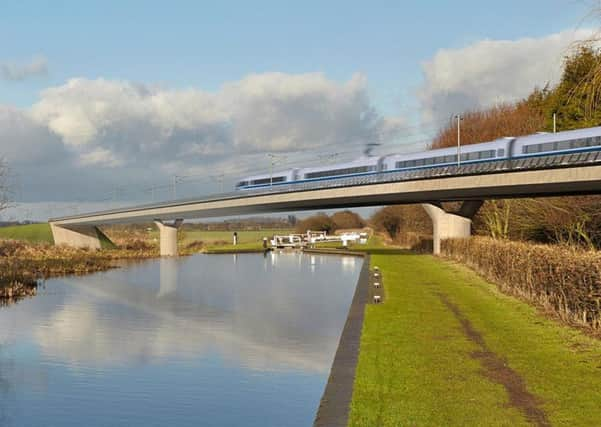High speed rail link to slash journey times


The improvements would cover an east-west section of northern England and be in addition to the north-of-Birmingham phase two of HS2 which will see a Y-shaped route going to Manchester and Leeds.
HS2 chairman Sir David Higgins said northern connectivity plans – dubbed “HS3” and backed by Prime Minister David Cameron and Chancellor George Osborne – would be “as important to the north of England as Crossrail is for London”.
Advertisement
Hide AdAdvertisement
Hide AdThe plans, if carried forward, would mean journey times between Leeds and Manchester could almost be cut in half while journeys between Leeds and Birmingham, Leeds and Sheffield, York and Birmingham, and Nottingham and Birmingham could also be reduced by a half or more, and many more journeys substantially shortened.
Phase one of HS2 involves a new high-speed line from Euston in London passing through Tory heartlands in the Chilterns to Birmingham, with an expected completion date of 2026. Phase two was originally scheduled to be completed in 2032-33, although Sir David is keen for this date to be brought forward.
The project is strongly supported by the government but bitterly opposed by some councils and residents along the phase-one route.
In Scotland in April, First Minister Alex Salmond announced an independent Scotland would commission a feasibility study on high-speed rail (HSR) and look at extending the line.
However, now, both the Scottish Government and the UK government are collaborating on a joint study on HSR which is yet to report its findings.
The cost of a high-speed line from Edinburgh and Glasgow to the Borders has previously been estimated at £8 billion.
Sir David said: “Improving connectivity is vital if Britain is to compete in the knowledge economy in which this country has a competitive advantage, but in which ease of travel is an essential element.
“Knowledge-based companies, whether they are in hi-tech manufacturing, the creative industries, finance or the law, have to be close, or feel close, to the talent, skills base, support network, knowledge pools, collaborators and clients necessary to create the hot-house atmosphere in which they thrive.
“That is why reducing the journey times between and within our cities isn’t just desirable for both passengers and freight. It is a strategic necessity.”